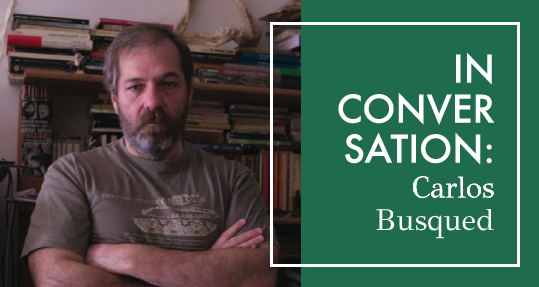In September of 1982, Ricardo Melogno murdered four taxi drivers in Buenos Aires. The crimes happened in close physical proximity and over a short period of time, but to this day, neither the perpetrator nor the many teams of experts who have treated Melogno have been able to discern a motive. Writer Carlos Busqued spent over two years interviewing Melogno and compiling the material that would eventually become Magnetized, published in English for the first time in June 2020 by Catapult.
The novel’s translator, Samuel Rutter, exchanged a series of emails with the author that touched on the writer’s process, the singularities of Ricardo’s case, and life in Buenos Aires under quarantine.
Samuel Rutter (SR): How did you first learn about Ricardo Melogno, and is his case still well-known in Argentina today?
Carlos Busqued (CB): No, quite the opposite actually—it was quite a sensation when it first happened, but the news cycle at the time didn’t cover it for long. Ricardo committed the murders right at the end of the last military dictatorship—two months after Argentina lost the Falklands War—so his crimes were quickly buried under an avalanche of news and exposés that were even more macabre.
I was a kid at the time of the murders and never heard about them back then—I lived in Chaco, a province in the far north of Argentina, so we didn’t read the press from Buenos Aires so much, and we only got some of their TV channels. So it was many years later that I stumbled across Ricardo’s case by chance. I got to know someone who worked on his treatment team, and I noticed that on the occasions I joined the team for after-work drinks or a birthday party, they tended to speak of Ricardo with empathy and curiosity. Every now and again they’d speculate about one or another detail of the crimes, which piqued my interest right away.
SR: What drew your attention to the case as a writer? Was there something in particular that inspired you to write about it?
CB: It was the strangeness of the whole thing, the fact that there really was no motive. Even today there is very little understanding of crimes with no known motive, and barely any research on the subject. A person who commits four identical murders is not acting randomly, but even so, neither Ricardo nor the numerous teams of specialists who examined him have been able to come up with a motive. Broadly speaking, when someone kills, they do it to survive. How that applies to Ricardo’s mindset when he committed the murders remains a complete mystery. READ MORE…



